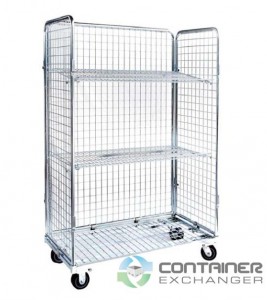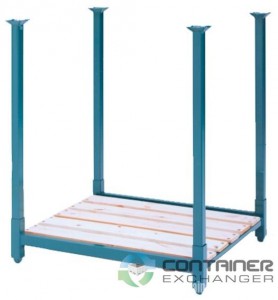| The use of material handling carts and racks for shipping and storing products is a convenient way to not only protect them from damage, but also to move them around safely and efficiently. In the long run, material handling carts and racks can save your organization from the unnecessary expense of having to replace damaged items or the lost time in trying to transport items from one place to another. But there are even more ways to save money if you are considering using carts and racks for your business. Here are just a few:
2. Check the market to see if someone is selling used material handling carts or racks. Most can be easily modified to meet different needs. You may be able to save quite a bit by purchasing used. Your packaging producer should be able to locate used racks for you as well. 3. Before placing a large material handling cart or rack order, have a prototype made. This way, your operators will be able to experiment with them, and make any necessary changes, before you commit to a final order. 4. Plan ahead. If your product needs to be handled in a special or unique way, you will want to inform your supplier. Although orders for carts and racks typically have a quick turnaround time, a sure-fire way to waste time is by rushing an order, ordering the wrong thing, and having to wait longer for the right product. 5. Identify everything you need your material handling cart or rack to do before placing an order. If they need to stack, collapse, roll, disassemble, or perform some other function, you will need to inform your supplier in advance. 6. Consider everything you may need to put into a material handling cart or rack. You may find that you want to use them to store supplies and materials as well as finished products. If so, the design of the carts or racks might have to incorporate dividers to accommodate different pieces and parts. You will want your supplier to know this before producing your order. 7. Make a “wants” versus “needs” checklist. Constantly adding new features will add up quickly. Do not eliminate “needs” features in an effort to save money. Rather, if you really want to decrease your costs, cross out only those features in your “wants” column. 8. Inspect and clean material handling carts and racks on a regular basis. Cleaning with mild soap and water will help extend the useful life of your carts and racks. And a little preventive maintenance every now and again will help prevent them from breaking completely. 9. Compare the cost of repairing and modifying carts and racks at your location versus sending them to an outside supplier. Sometimes, your carts can be modified to fit your needs by adding or removing something simple. Save costs by doing this yourself, if you can. 10. When you are done using your material handling carts and racks, consider selling them. Chances are, if they have been maintained and kept clean, there will be another company who can use your used items. Place and advertisement or have your supplier spread word that you would like to sell them. While you won’t get top dollar, something is better than nothing. In closing, material handling carts and racks are an excellent way to protect products “in process” or those being shipped to the end user. Always rely on your packaging producer for guidance and direction to assure they meet your needs and produce the results you expected. |

